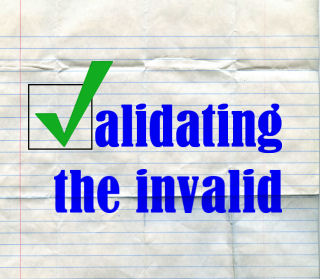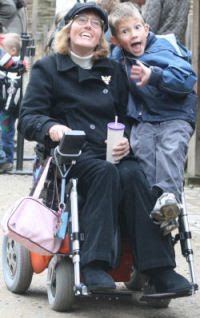Those who know me know that I have worked whenever I could. As a teenager I took on my first “job” when my parents sent me to camp for a six week summer vacation. The dining room staff needed people to set tables before each meal and clean them up afterwards. Ten dollars a week could be made if we did the Job. Sure I was on vacation but money was money! Every morning those campers on the dining room crew were woken an hour before the other campers and went to work set plates, silverware, and condiments needed for the most important meal of the day.
We’ve all been to a restaurant at one time or another – how often have we seen a busboy/busgirl with a disability let alone one in a wheelchair? A busgirl in a wheelchair is what I was for those six weeks. I didn’t need a cart – I had a lap full of dishes that were placed on the table as I wheeled around to each seat. When my lap was empty I did the same with the silverware and condiments. Of course all this needed to be done in a timely fashion as the dining room would soon after be filled with hungry campers. I enjoyed the work and did it for three consecutive summers.
My parents were used to my money-making schemes. When I was ten, I collected newspapers from neighbors until the back of our garage was full. My father was the one to help me tie them into bundles, load the car and drive them and me to the “junkie”. At the junkyard we unloaded the car by putting the bundles onto a cart that was weighed. My wages depended on how heavy the thousands pieces of paper were. We did this until the price of gas outweighed the newspapers.
The high school I attended had a summer work program for its disabled students. This program allowed those of us with a disability to be intergraded into the work force while gaining paid for work experience. There were several job sites to choose from - a park, a hospital and an office setting. My first summer in the program, I chose to work as a librarian in a hospital library. The job requirement of shelving and checking books in and out was not a problem for me as I was able to reach the high shelves by standing from my wheelchair. The following year I chose to do something different and went to work for the Parks Department. The Park for All Children had just been built and needed employees to supervise children at play. It was built to be totally handicap accessible so children in wheelchairs could get around easily and play with everything – even the sandboxes. In my electric wheelchair I was able to maneuver everywhere and was able to supervise the children at play as well as run group activities for them. After my second summer there, I was offered a year-round position which I took. Although the park was closed in the winter months, I and a fellow employee (non-disabled) went to various neighborhood schools with puppets known as
The Kids On The Block to teach non-disabled children about disabilities. I did this until my family and I moved making the commute too far. Besides, I wanted to become a writer.
As a prerequisite to becoming a writer I needed four years of college to study English. The first year was financed by my parents, a scholarship and student loans. In the second, I decided that if all the other students had a part-time job to get through college, I could too. The man who ran the college’s cafeteria and I became friends but when I solicited him for a job he thought I was kidding. He laughed and said, “Ha you in a cafeteria!” When I told him I had experience in setting and clearing tables he stopped laughing and said, “Ok. We can try it.” Two weeks later I was the one working the most hours.
A student of English definitely needs to write many term papers and articles for the school’s newspaper, so I spent many hours in the computer lab of my college library. I enjoy helping people so when someone had a computer related problem, I tried to help. Since I was doing this just about every day, the head librarian offered me a paid position of “tutor”. I was paid bi-weekly as part of a student aid program the school had. I then had two jobs and was going to school.
After I graduated with a degree I did some volunteer writing for the newsletter of Suffolk County’s Independent Living Center.
SILO advocates for people with disabilities and helps them live independently in their community. It was when I landed an interview with actress
Geri Jewell that I was offered the position of the newsletter’s editor position. Since SILO is a non-profit organization so they could not pay me but I took the position as a way of gaining work experience.
The paid position came when I went to work for the Nassau County Police Department as an Inventory Custodian. Nassau County of New York had been given money to hire twenty disabled employees. This was done as an incentive to get disabled people to participate in the economy. I and a police officer kept records of everything the department bought and its surplus through data entry of assigned numbers, serial numbers, model numbers and locations. When something was thrown away we travelled to the junkyard to ensure it was gotten rid of properly. I was employed with the county for twelve years before retiring (you needed ten years to qualify for a pension) and moving to the Netherlands.
When I moved to the Netherlands my husband had the benefit of being able to take me along to work with him. I didn't know anyone or the language and he didn’t want me to be alone all day. I always took my laptop along so I could write and develop my website
Martensnetwork. When his boss saw I knew how to use a computer, she offered me a job as a Data Analyst and Editor. I worked in his office for three months until I became pregnant with our son. I didn't want to work after he was born. I think a mom should be home to raise the children whenever possible. I also believe children should never come home to a locked door.
Instead of working, my days were spent taking care of our son. My sister was the one who took me everywhere. She lived here ten years before I did. Unfortunately just when I was living here two years, she died and our son was still small so I needed to be home all the time. When he turned seven he was independent enough for me to spend one day a week at a recreation center for the disabled. Before the center could accept me, I needed to be "certified". That means the local government office had to give their approval. I had to go to their doctor who said yes I would benefit from the center (mentally). I now go to the center one and a half days a week. On the days that I’m there, my husband works from home. I enjoy making things there (ceramics and wood working) but what it has to do with my mental health who knows. I am just as happy home.
Every few years, the participants of the recreation center need to be recertified by the government. The recertification office called our home to verify their paperwork and got my husband on the line. I happened to be at the center that day. As they were discussing me it seemed to him like they were talking about a whole other person. They were under the impression I didn't know how to handle money, they said I could eat by myself and needed help in the bathroom which is the other way around – I need help eating and can go to the bathroom on my own. Once my husband corrected everything with them, they asked him why I didn't work. He said I wanted to go back to work but didn't know how to go about it since I didn't receive the government’s “unfit to work” benefit.
Disabled people can apply for an “unfit to work” benefit provided they are Dutch and have lived in the Netherlands prior to their seventeenth birthday. The government is now running out of money to pay out this benefit so as an incentive to save money they are trying to get employers to hire these disabled people. The (full) benefit is no longer paid to the disabled person when the employer is paying them a salary. The employer however does not directly communicate with the person wanting a job. In the Netherlands there are organizations that serve as mediators that help people with a disability find a job, arrange for whatever they need to do the job and make sure the employee and employer are satisfied with one another. The person on the phone referred us to such an organization and said they were only recertifying me for a year. If in that year I could not find a job, they would certify me four.
My husband immediately called this organization and explained to the secretary that I had Cerebral Palsy and wanted to work. Her answer was, “And what are we supposed to do with her?” After four months of waiting I was assigned a case worker who was very nice and really wanted to help me find a job but her resources were limited. Since I did not receive any governmental benefits, someone in her office suggested I apply for the “unfit to work” benefit. I was turned down for this benefit because although I am now Dutch, I did not live in the Netherlands before my seventeenth birthday.
Strike one.
The next suggestion we got was to register online with a local job finding office. The case worker came to my home and we spent an afternoon filling in the online registration form. When we got to the end of it there was a message on the screen saying we needed to call their office within twenty-four hours in order for the registration to be considered valid. Since it was late in the day she called first thing the next day and fully explained my situation. She was told we should come to their offices whenever convenient we didn’t need an appointment. We went there a week later. My husband could not transport me as he needed to go to work so I took a seventy-five minute taxi ride to the office building that was twenty minutes from my house. When we got there we were told the job coach that handles the requests of people with disabilities wasn't there and couldn't help me anyway because I don't receive benefits. The government would not save money by getting me a job, so I wasn't interesting for them.
Strike two.
The woman at the job coaching office thought I could get enrolled in a program under the WsW (social employment policy act) that gives jobs to disabled people but placement could take up to four year waiting list for placement. This program turned out not to be for me.
I was also told there was no guarantee that I would get the type of employment I wanted and could wind up working in a type of “warehouse” situation - with other disabled people for minimum wages with no advancement. I had just thrown away €10.00 to hear all this. Meanwhile, a job coach receives money from the government to find people jobs but me they can't help.
My case worker couldn't believe this either and went to a woman who had her own “re-integration” office to see if she could help me. They both came to my home with a positive attitude towards my working. Her first priority though was to go to the government on the city level to see if they would release funds to me a “Nugger”. A “Nugger” is someone who is not entitled to the “unfit to work” benefit.
A month after our meeting I received the following letter:
Till last Thursday I have been dealing with the city, to find out if there would be any possibilities for a re-integration budget within the framework of so called “Nugger status” (person not entitled to an allowance).
I had phone calls with a number of people who have to do with all aspects of re-integration, thus short-term routes as well as long-term routes. I presented your case Christine, and regrettably it is impossible to generate a re-integration budget. Reasons are: the distance to the job market and to independent participation are estimated too big.
The city of Heerlen knows of a project “Pioneering Work” in which people with long distances to the job market, participates in projects with the principle of preservation of their allowance. However, I had a conversation with someone who has a project with Humanitas (taking care of children for which the physical condition is of importance) and a neighborhood route where volunteers among other things hang up a painting in people’s homes and go out shopping with people. Considering your physical limitation, your mobility and the “voluntary character” of these projects, this is not an option.
Again the question arose whether you were signed up for/familiar with the WsW (social employment policy act). This would be most applicable for you. I indicated that you would rather not make use of the WsW and also that you would not like to work on a voluntary basis but with a contract of employment.
I hate to say it, but there are currently no funds available, Christine for your re-integration.
With kind regards,
Strike three!
She was right – I did not want to wait four years to see where I might wind up nor did I want to waste my time and money taking tests and getting results to what I already knew. I have Cerebral Palsy and can be successfully and gainfully emloyed.
As for working on a voluntary basis – I have been doing that for the last four years at my son’s school and therefore was not looking for more volunteer work. Volunteer work is exactly what the disabled people who do receive governmental benefits do. Here it all comes down to having some kind of government benefit before anyone can help you.
What am I doing now - I am still going to the recreation center. I was recertified for another four years. In June 2010 I decided to write a book about me and my son. I hope to be done sometime in 2012.




















